- Home
- JoAnn Ross
Sunset Point: A Shelter Bay Novel Page 4
Sunset Point: A Shelter Bay Novel Read online
Page 4
When the mantel clock chimed midnight, Tess decided she’d let him invade her mind for too long. Tomorrow morning she’d call Donovan, who’d been handling the recent rash of threatening calls she’d been receiving and tell him about the stranger. Then, having handed the problem over to someone else, she could hopefully put the man out of her mind.
As she rose from the sofa, her phone, which she’d put on the side table to recharge, shattered the silence.
She didn’t have the slightest doubt that it was him. The man in Shelter Bay. Even as she assured herself that it was impossible, Tess knew.
Always before, the calls had come from what the police had determined was a string of untraceable burner phones. This time a name appeared on the caller ID. A name that was vaguely familiar. Once again she wondered if he was someone she’d sent to prison?
But no, she’d definitely remember that face.
Perhaps an attorney, wanting to cut a deal for one of his clients? No, again. Those discussions were always conducted in her office, occasionally in the hallways of the courthouse or judge’s chambers. Never had she received such a call at home.
There were people who could ignore a ringing phone. Tess was not one of them. Cursing beneath her breath, she scooped it out of its charger.
“How did you find me?”
“You dropped your wallet while you were trying to get your keys out of your purse. Right after you maimed me.”
Surely he wasn’t calling for her to apologize for defending herself? “My behavior would be considered by any court in the land to be a case of self-defense. And for the record, it was also nowhere near a maiming.” She could show him crime photos of actual criminal physical attacks to prove that point. “And I only reacted appropriately after you attacked me.”
“Attacked? I just wanted to ask you a few questions.”
“Do you always manhandle total strangers in order to get them to talk to you?”
“Going to charge me with assault and battery, counselor?”
“Don’t tempt me. I just may. Unless you have a very good explanation for your behavior, Mr. Breslin. Which brings up some questions of my own. The first being how you got my number.”
“I don’t suppose you’d believe I’m a really good Googler?”
“No.” If she hadn’t known the call was being monitored, she would have been even more nervous. “Why do I recognize your name?”
“Perhaps you’ve read one of my books?”
Tess blinked as the name finally clicked. Nate Breslin’s horror novels invariably made all the bestseller lists. “You’re that Nate Breslin?”
“I never lie to a lady,” he replied amiably, sounding nothing like the dangerously intense man she’d met earlier. “Especially one who can get me thrown into jail.” His voice softened. “Did I really hurt you?”
Tess struggled to remain unaffected by his caring tone. She was also feeling guilty for having caused far more discomfort than she’d received. “I’ll have bruises for a week.” Okay. That was a major exaggeration. But he deserved it.
“Damn. I really am sorry. It’s no excuse, but things have been a little”—he paused, as if searching for the proper word—“strange, lately.”
“I’d think that would be a normal condition, given your line of work.”
“So, you have read my work?”
“I don’t read horror novels.” Having lived one firsthand, she stuck to romance novels and historical biographies. There was silence. Certain that it wasn’t the usual re-sponse the admittedly handsome author got from women, Tess was congratulating herself on exacting some small revenge for his outrageous behavior when he chuckled.
“I suppose I’ll just have to change your mind.”
“I wouldn’t waste my time if I were you. Now, about my wallet—”
“I’ll bring it up to the city tomorrow. How’s your calendar? Are you free for lunch?”
“I’m scheduled to be in court. You can leave the wallet with the receptionist.” Ignoring the lunch suggestion, she gave him her office address. “Good night, Mr. Breslin.”
The dead air told Nate that she’d hit the end button. “Well, at least she isn’t indifferent.” A slow smile crossed his lips. “Tomorrow we begin sorting out the mystery of the lovely but decidedly prickly Deputy District Attorney Teresa Lombardi.”
Imbued with a confidence he hadn’t experienced in weeks, Nate walked across the room and turned on the computer. He laughed out loud at the words that appeared on the screen.
I’ve charted the course, mate. Now it’s up to you to bring us to harbor.
8
The two men sat in the wood-paneled room, a framed photo of a young Tess Lombardi on the table between them.
“So,” one asked, “did you follow her down the coast?”
“Yeah.” The second man took a pack of smokes from inside his jacket pocket, shook out a cigarette, and lit up. He knew the risks, but hell, a guy had to have at least one vice.
“And?”
“She met with the sheriff and they went and interviewed that bigamist’s victim.”
“Doing some handholding,” the first said.
“That would be my guess.” He inhaled deeply and blew out smoke rings that floated up to the ceiling. “Then they had girly cupcakes and went their separate ways.”
“So, that was it?”
“No. This guy stopped her on the way to her car.”
The first man tensed. Neck, shoulders, arms. He found himself wishing he still smoked, but, priding himself on his steely self-control, he resisted mooching one. He also reluctantly refrained from the Scotch, which he could definitely use about now, that was hidden away in the bottom drawer of his desk. Just like an old-style P.I. from a Raymond Chandler or Dashiell Hammet mystery, he thought with grim humor.
Maybe his next case would involve a search for a black bird. And he wouldn’t mind if it involved a mysterious blond, although he’d just as soon she not be as deadly as the one Sam Spade had gotten tangled up with in the Maltese Falcon.
“What did he do? He didn’t put his hands on her, did he?” A knee-jerk anger and fear twisted his gut like a fist.
“He grabbed her arm. I was too far away to hear exactly what he said, but it sounded like he told her that she couldn’t leave.”
“Jesus, Mary, and Joseph.” He dragged his hand through his hair. He should have been there himself, dammit.
“Don’t get your tighty-whities in a twist. You would’ve been proud. Our girl took care of him like a pro. Hammered his instep and may have broken his nose. When she took off, he was hopping around, nose spurting blood like Old Faithful, and cursing like a drunken sailor on shore leave.”
Mike Brown leaned back in the worn leather recliner and felt every muscle in his body relax. “That’s my girl.”
He was damn proud of how his daughter had turned out. Smart as a whip, she’d soared through an undergraduate degree in criminal justice at Stanford and then Stanford Law in six years. He’d missed her like hell during her time in California, but understood that, had she gone to the University of Oregon or Willamette, her name would have gained recognition and possibly made her a topic of gossip. So he’d encouraged her desire to go out of state.
What had surprised and pleased him was that once she’d graduated at the head of her class and had that brand-new shiny law degree in hand, she’d returned to her home state and aced the bar exam on the very first try, when the typical pass rate averaged mid-sixty percent.
And then, what made his heart really swell with pride was, instead of accepting all those big-bucks offers from the high-priced North Couch Street law firms—where even the office rent was one of the most expensive in the country—she’d gone to work for peon wages at the district attorney’s office. Following, she’d told him, in his footsteps, bringing justice to those who needed it. And hadn’t that made him burst his buttons?
But still, although intellectually Mike knew that Tess was a capable, intelligen
t adult woman, a very strong part of him still thought of her as his baby girl. Which was why, when she’d started receiving those threatening phone calls, he’d asked his longtime friend to watch out for her. It wasn’t that he didn’t trust the PPB. Hell, he’d been one of them for the better part of his life.
But a one hundred percent success rate was impossible in any business. In law enforcement, the odds were even lower. Which was why he’d teamed up with Jake again. Because other than himself, there wasn’t a guy on the planet with more reason to keep Tess safe.
“Did you recognize the guy?”
“It was getting pretty dark, but when he walked beneath a streetlight, he looked familiar. I got a photo on my phone I’m sending to my guy at Portland PB tomorrow.”
“Why not now?”
“Because he’s out of town until morning. But I also got a good shot of the guy’s plates as he drove away, so we’ll know tomorrow.”
“You didn’t leave her alone?”
“Hell, no. Quinn’s on the case.”
“That’s good to know.”
Mike liked and respected Donovan Quinn. For a while he’d hoped the detective—whom he’d once mentored—and Tess would get together because he couldn’t have handpicked a better son-in-law. But after a couple dates, they’d remained, from what he could tell, merely friends.
“Of course, she’ll scream bloody murder if she spots him.” She knew Quinn was monitoring her calls. But Mike knew if she realized her every move was being shadowed, she’d be majorly pissed off.
“Quinn’s too good at stakeouts to be caught. Not by Tess, nor whoever the guy is making those calls.”
“It’s the Russian,” Mike said. “The Viper. He’s not making them himself, but he’s pulling the strings.”
“That would be my guess. I had a thought driving back up from the coast. What would you say to bringing Quinn into the new agency?”
“He’d never jump ship to come play private eye with us. The guy bleeds PPB blue.”
“So do you,” Jake pointed out.
“Yeah, and I’d still be there if I had anything to say about it. But my retirement wasn’t exactly voluntary,” Mike reminded him.
He’d been going stir-crazy trying to figure out what the hell to do with all the time he’d suddenly found himself facing. He’d never realized how long a twenty-four-hour day was until that damn quack doctor had forced him into retirement, leaving him to talk back to Jeopardy—“famous crime novels for one-hundred dollars, Alex”—and watch old John Wayne westerns and fishing shows. Which was when he’d discovered that as boring as fishing was, watching two guys trying to land a fish was mind-numbing.
Although his gut twisted itself into knots whenever he thought about his little girl in danger, Mike couldn’t deny that it felt damn good to be getting back in the action again.
9
Nate stood at the back of the crowded courtroom, watching in admiration as Tess made her closing statement to the jury. He was familiar with the case of the plump, white-haired woman accused of laundering vast amounts of drug money through the restaurant she ran with her son.
The lengthy legal proceedings consisted of two separate trials—the same judge but different juries—for Janet Kagan each morning and her son and alleged partner, John Kagan, each afternoon. The case had captured the imagination of the press, which had the local cable company televising excerpts from each day’s trials. Nate wished he’d tuned into the station earlier. It would have saved him a great many sleepless nights.
Granted, Teresa Lombardi was not the mirror image of the woman in his dreams. The vision who’d been disturbing his sleep night after night had a thick mane of straight hair that fell like rainwater down her back. Teresa Lombardi’s glossy black curls hit her shoulders. But everything else was the same.
The eyes of both women were a rich, deep brown, framed by thick sooty lashes that curled upward. Although he’d yet to see her mouth curve into a smile, he hadn’t the slightest doubt that the effect would be devastating.
At the moment, those lips were pulled into a tight, grim line as Tess put her hands on the jury box railing and addressed her audience. In a few minutes, Judge Gerald Keane would instruct the jury, and the case would be out of her hands.
At least until this afternoon when she returned to the courtroom to make her closing remarks in the son’s trial. Tess stifled a weary sigh and forced herself to go slowly.
“The defense attorney, Mr. Parker, would ask you to believe that Mrs. Kagan’s only crime is faulty bookkeeping. Yet you’ve heard Mr. Lawton Drew, president of Multnomah Community Bank, where Mrs. Kagan opened an account with twenty thousand dollars in cash, testify that she told him she was taking care of people who needed to get their money out of the country without a hassle,” Tess reminded them.
“You’ve also heard Mr. Drew testify, under oath, that Mrs. Kagan promised him a one-percent commission in return for his services.”
That, of course, had been Kagan’s downfall. In assuming that all individuals were as greedy and grasping as she was, the elderly criminal hadn’t counted on Lawton Drew going to the authorities immediately after she’d left the bank.
The jury members’ gazes turned toward the woman who looked as if she should be baking cookies for her grandchildren rather than standing trial. A few nodded thoughtfully as Tess’s words brought back the banker’s testimony describing how, for the past three months, he had been working closely with the district attorney’s office, DEA, and FBI on a complicated sting that involved Multnomah Community Bank and a half dozen more loosely regulated ones in the Cayman Islands.
Tess walked over to the table where evidence was displayed and picked up a thick stack of thousand-dollar bills, riffling through them idly as she continued speaking. “We are not talking about nickels and dimes, ladies and gentlemen. Mrs. Kagan was drowning in millions of dollars that she laundered through her River City Sports Bar and Grill for a major drug cartel.”
With the bound bills still in her hand, she walked over to stand beside the defense counsel’s table. Twelve pairs of interested eyes obediently followed her.
“This elderly woman, who bears such a striking resemblance to my grandmother and undoubtedly yours, as well, used the United States banking system, Western Union, and various other fund transferring systems to send millions of illegal dollars back to the cartel.”
She could sense the doubt creeping in. Like tendrils of fog slipping beneath the heavy wooden door from the nearby Willamette River into the jury box.
“Thanks to all those novels we’ve read, movies we’ve watched, and even news reports of major drug busts, drug-related money laundering conjures up images of plastic-wrapped bundles of bills, which look a great deal like this package I’m holding, hauled around the country in the backs of trucks.
“But Mrs. Kagan, who already has a criminal record for Medicare fraud in Florida, wasn’t one to let time pass her by. There’s a new virtual goldmine out there, and she wasn’t about to miss out. Which was why she opened the River City Sports Bar and Grill. One of the ways cartels launder money is to clean it through otherwise legitimate businesses that work as front companies, such as restaurants.
“The defense attorney has spent a lot of time trying to convince you that international money laundering is a complex crime that no ordinary person, especially a woman in her sixties, could pull off. But in reality, the model is almost always the same. And never very complicated.
“Janet Kagan ran a popular restaurant. She and her son served good food at fair prices, which brought in both tourists and locals. The bar and grill would have provided a good, honest living. But that wasn’t enough. Because she’s greedy, dishonest, and doesn’t believe the law that all of you and I are expected to follow applies to her.
“The amounts varied from month to month, but on average, for every two thousand dollars of legitimate money Mrs. Kagan brought in, she might bring in, say, thirteen thousand from drug trafficking. Then, she�
�d list the entire fifteen thousand as income from the restaurant on her income taxes.
“It’s that simple. Mrs. Kagan was taking the drug cartel’s dirty money, putting it through a wash cycle, and sending it back squeaky clean. For this she charged anywhere from a one to three-percent fee. Which may not sound like much. Until you realize that millions and millions went through her laundry over a five-year period.
“The key to the longevity was the grill being such a high cash flow business. Because if she’d claimed earnings of fifteen thousand on any given month but only had bank deposits of two thousand, that would have drawn attention, and she’d have gotten caught much sooner.
“Just as she would have if she’d opened up a high-end restaurant, where diners typically pay with credit cards. But a bar and grill, especially one that’s open for lower-priced breakfasts in a financial neighborhood of office buildings and does a large part of its business in drink sales, brings in a significant percent of its proceeds in cash. So, there are no records to disprove whatever she might claim.”
She paused, staring silently down at the woman for a long, pointed moment. Showing no conscience, Janet Kagan merely returned the look, meeting Tess’s gaze with not so much as a flinch.
As she returned to stand directly before the jury, Tess slowly shook her head.
“The defense attorney will tell you that Mrs. Kagan is an innocent victim of her son. He will ask you to believe that her only involvement in the business was to cook the meals. Which did, as you’ve heard, also included less expensive clams and oysters illegally harvested from unapproved waters, thus risking the health and even the lives of innocent diners.
“When I proved that she was the one who kept the books and made the bank deposits, his answer was that she only wrote down the amounts her son told her. Then, as if that were too implausible, Mr. Parker tossed in a tall tale of her much larger, much younger son being so abusive she feared what would happen if she didn’t go along with his scheme.

 Magnolia Moon
Magnolia Moon Summer on Mirror Lake
Summer on Mirror Lake Blue Bayou
Blue Bayou Champagne and Moonlight
Champagne and Moonlight No Regrets
No Regrets Long Road Home
Long Road Home Southern Comforts
Southern Comforts Herons Landing
Herons Landing Untamed
Untamed No Regrets (Mira Romance)
No Regrets (Mira Romance) Dark Desires
Dark Desires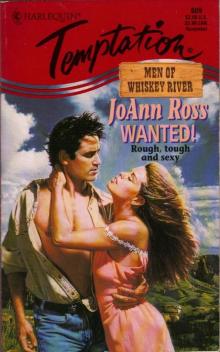 Wanted!
Wanted! River Road
River Road Midnight Runaway
Midnight Runaway The Long Way Back
The Long Way Back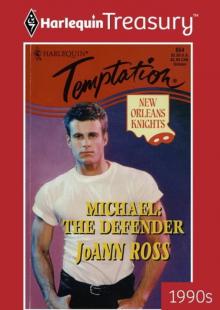 Michael: The Defender
Michael: The Defender Hot on the Trail
Hot on the Trail When I'm With You
When I'm With You Legends Lake
Legends Lake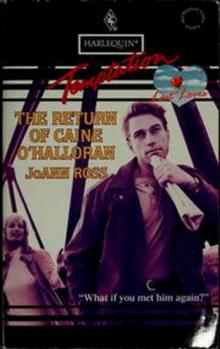 The Return of Caine O'Halloran
The Return of Caine O'Halloran Dance with a Dynasty
Dance with a Dynasty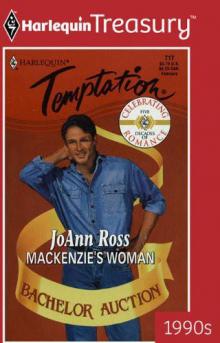 MacKenzie's Woman
MacKenzie's Woman Impulse
Impulse Sunset Point: A Shelter Bay Novel
Sunset Point: A Shelter Bay Novel You Again: A Shelter Bay novella (Shelter Bay series Book 8)
You Again: A Shelter Bay novella (Shelter Bay series Book 8)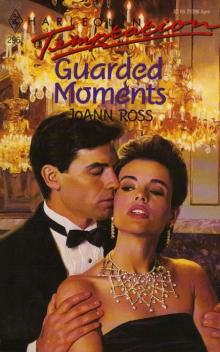 Guarded Moments
Guarded Moments No Safe Place
No Safe Place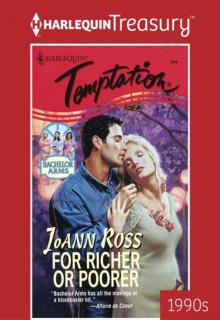 For Richer or Poorer
For Richer or Poorer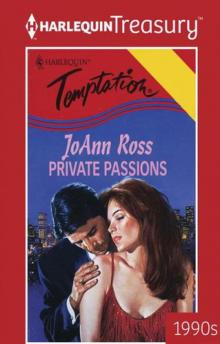 Private Passions
Private Passions Once Upon a Wedding
Once Upon a Wedding Snowfall on Lighthouse Lane
Snowfall on Lighthouse Lane Christmas on Main Street
Christmas on Main Street A Place in Time (Rum Runner Island Book 1)
A Place in Time (Rum Runner Island Book 1) Leaving Blue Bayou
Leaving Blue Bayou The Return of Caine O'Halloran: Hard Choices
The Return of Caine O'Halloran: Hard Choices Lucky in Love
Lucky in Love The Prince & The Showgirl
The Prince & The Showgirl Castaway Cove
Castaway Cove A Woman's Heart
A Woman's Heart One Summer
One Summer Ambushed
Ambushed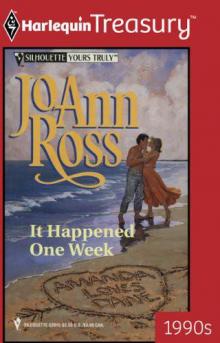 It Happened One Week
It Happened One Week Home by the Sea
Home by the Sea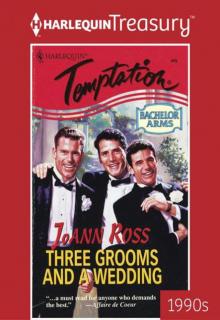 Three Grooms and a Wedding
Three Grooms and a Wedding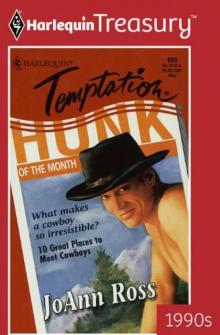 Hunk of the Month
Hunk of the Month Never a Bride
Never a Bride Sun Kissed
Sun Kissed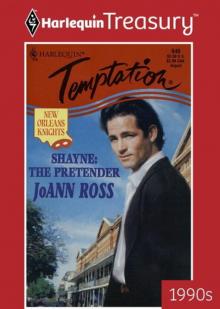 Shayne: The Pretender
Shayne: The Pretender Legacy of Lies
Legacy of Lies Far Harbor
Far Harbor Finn
Finn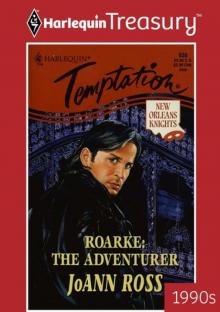 Roarke: The Adventurer
Roarke: The Adventurer I Do, I Do...For Now (Harlequin Love and Laugher)
I Do, I Do...For Now (Harlequin Love and Laugher) Briarwood Cottage
Briarwood Cottage On Lavender Lane
On Lavender Lane Sea Glass Winter
Sea Glass Winter River's Bend
River's Bend Christmas in Shelter Bay
Christmas in Shelter Bay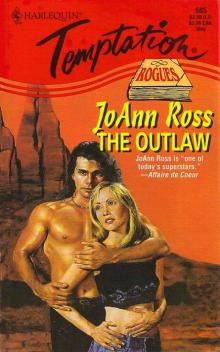 The Outlaw
The Outlaw Castaway Cove (2013)
Castaway Cove (2013) Confessions
Confessions Moonshell Beach: A Shelter Bay Novel
Moonshell Beach: A Shelter Bay Novel